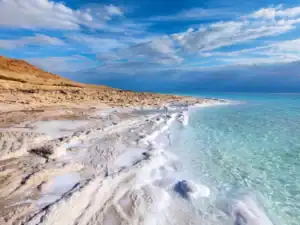Explore the impact of Dead Sea minerals on environmental conservation. Unearth this extraordinary treasure with us!
Immersing ourselves in the extraordinary world of Dead Sea minerals, we find a wealth of unique and potent components that truly set the Dead Sea apart as a marvel of the natural world. This hypersaline lake is not merely a tourist attraction. It’s a treasure trove of potent minerals like magnesium, calcium, potassium, and bromide. These minerals are not just unique to the touch and beneficial to human health, but they also hold significant potential for environmental conservation. In this article, we will delve deep into the impact of Dead Sea minerals on environmental conservation. These minerals could pave the way for a sustainable future, from replenishing soil nutrients to purifying air and water.
The Impact of Dead Sea Minerals
The Dead Sea, famously known as the Salt Sea, possesses an unparalleled mineral concentration. It contains an array of minerals, each with its distinct properties. The primary minerals include magnesium, known for its hydration and anti-inflammatory attributes; calcium, which supports clean water and aids in plant growth; potassium, a critical element for water conservation due to its water-retention abilities; and bromide, recognized for its potential role in air purification.
Stepping into the realm of environmental conservation, the unparalleled healing properties of the Dead Sea assume a larger, global significance. The minerals from this unique body of water possess singular properties that can contribute dramatically to various conservation efforts. For instance, magnesium, a key mineral in the Dead Sea, is vital in improving soil structure by promoting water retention and nutrient uptake, which is crucial for enhancing agricultural yield. In water conservation, calcium stands out for its essential role in maintaining the pH balance of water, thereby ensuring a safer habitat for aquatic life. Potassium, another vital mineral, amplifies the soil’s capacity to retain water, reducing agricultural water wastage. Moreover, let’s not overlook bromide, which could be a game-changer in air purification strategies with its potential to react with certain pollutants.
The Environmental Significance of Dead Sea Minerals
Dead Sea minerals hold immense potential for soil conservation. Magnesium, in particular, enhances soil structure, promoting water retention and nutrient uptake, which is critical for agricultural productivity. Furthermore, potassium improves the soil’s ability to hold water, reducing the overall water requirement and thus aiding in water conservation. These minerals increase soil fertility and mitigate the adverse effects of soil erosion, desertification, and other forms of land degradation.
In terms of water conservation, calcium plays a pivotal role in maintaining the pH balance of water bodies, ensuring a safe environment for aquatic life. On the other hand, bromide found in the Dead Sea may improve air quality by reacting with certain air pollutants and aiding in their removal. Lastly, research is underway to explore the potential role of these minerals in renewable energy production, highlighting their contribution to broader environmental sustainability efforts. The unique properties of Dead Sea minerals could be the key to innovative solutions for global environmental challenges.
Real-Life Applications
In real-world applications, Dead Sea minerals are already making a noticeable impact, and the approach to utilizing them can be likened to finding ways to enjoy the process and take good care of yourself when moving homes. Furthermore, in Israel, for instance, soil conservation programs have employed magnesium and potassium from the sea to revitalize eroded soils and reclaim arid lands for agricultural use. How these minerals are leveraged to improve the land reflects a thoughtful and nurturing process, much like how one would take care of oneself during the often stressful moving time. The increase in soil fertility has been remarkable, demonstrating the direct benefits of these minerals on land preservation and mirroring the rewards of self-care and enjoyment in moving.
Similarly, water conservation initiatives in the region have seen the utilization of Dead Sea minerals like calcium to maintain optimal pH in water bodies, fostering healthier aquatic ecosystems. Regarding air purification, research conducted in laboratories has revealed the potential of bromide to react and neutralize certain airborne pollutants. Beyond these, there’s also growing interest in harnessing the electrolytic properties of these minerals for renewable energy solutions. As research progresses, the versatile applications of Dead Sea minerals continue to expand, promising exciting advancements in environmental conservation.
The Future: Dead Sea Minerals and Sustainability
As we look ahead, the future potential of Dead Sea minerals in environmental conservation appears vast. That goes hand in hand with their well-known applications, such as the role of Dead Sea minerals in hair care products, and yet it represents a leap towards new frontiers. Current research explores new ways to harness these minerals for innovative conservation efforts. The applications seem limitless, from creating novel air purification technologies to designing advanced water treatment processes and soil remediation strategies. The potential to tap into the electrolytic properties of these minerals for renewable energy solutions also presents a compelling frontier in the quest for sustainable development.
However, while exploiting the riches of the Dead Sea, it is equally critical to ensure their sustainable extraction. Responsible mining practices must be adhered to preserve the ecological balance of this unique region. Thankfully, the utilization of Dead Sea minerals aligns well with the United Nations’ Sustainable Development Goals, particularly in promoting responsible consumption and production, climate action, and life below water and on land. Embracing these minerals might well prove instrumental in shaping a sustainable future.
Conclusion
The impact of Dead Sea minerals reaches far beyond their well-known health benefits. From revitalizing soils to conserving water, purifying air, and potentially fuelling renewable energy solutions, these minerals present a wealth of possibilities for environmental conservation. Their unique properties and diverse applications affirm their importance in fostering sustainability. However, further research and responsible mining practices are paramount to unlock their potential fully. As we move towards a future marked by pressing environmental challenges, harnessing the power of Dead Sea minerals could be an integral part of our sustainable solutions.







